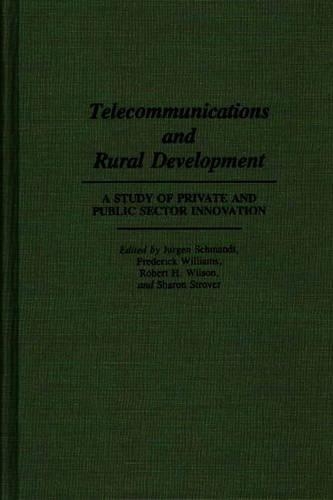
Telecommunications and Rural Development: A Study of Private and Public Sector Innovation
(Hardback)
Publishing Details
Telecommunications and Rural Development: A Study of Private and Public Sector Innovation
By (Author) Jurgen Schmandt
Edited by Frederick Williams
Edited by Robert H. Wilson
Edited by Sharon Strover
Bloomsbury Publishing PLC
Praeger Publishers Inc
30th October 1991
United States
Classifications
Tertiary Education
Non Fiction
384.0973
Physical Properties
Hardback
272
Description
This study assesses the potential that telecommunications advances hold for rural America and is the outcome of the third in a series of policy research projects into issues relating telecommunications policy and economic development undertaken by research teams of faculty and students at the Lyndon Baines Johnson School of Public Affairs and College of Communication, University of Texas at Austin. All three projects have been concerned with telecommunications at two levels: the effects of telecommunications advances on our economy and society and the policy framework that has resulted from divestiture of AT&T. The first project studied state telecommunication policy and resulted in the publication of Telecommunications Policy and Economic Development: The New State Role (Praeger, 1989); the second, which dealt with cities and large telecommunications users, produced The New Urban Infrastructure: Cities and Telecommunications (Praeger, 1990). Telecommunications and rural development has been much more frequently researched in Third World countries than in advanced industrialized ones and this volume represents a significant contribution to the literature on the subject. The findings are divided into four general research areas. Following an introduction, Chapter Two looks at some fascinating telecommunications applications in American rural businesses from Wal-Mart, to traditional rural businesses like the lumber industry, to the opening of new businesses like telemarketing. Chapter Three assesses the use of telecommunication for delivery of public services from the U.S. Department of Agriculture to health care and distance education. Chapter Four asserts that many of the benefits of telecommunications for rural America will only be realized if the small independent or cooperative telephone companies remain healthy and progressive. The substantial contribution to community development, from community revitalization and regional cooperation to infrastructure upgrading, is the focus of Chapter Five. A final chapter offers conclusions. This is required reading for students, scholars, and practitioners in the fields of communications/telecommunications and government.
Author Bio
FREDERICK WILLIAMS is Director of the Center for Research on Communication Technology and Society at the University of Texas at Austin where he also occupies the Mary Gibbs Jones Centennial Chair in Communication. He is the author of numerous books and articles, the most recent of which are, Research and the New Media: The New Communications (second edition), and Measuring the Information Society. ROBERT H. WILSON is professor at the Lyndon B. Johnson School of Public Affairs of the University of Texas. He is the coeditor of Telecommunications and Rural Development (Praeger, 1991) and The New Urban Infrastructure (Praeger, 1990).
